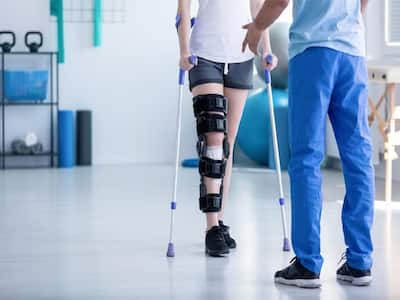
While the majority of total knee replacement surgeries (TKRs) last for about 15-20 years, a revision operation may be necessary in some situations.
In the last five years, there has been an increase in the number of joint replacement surgeries. Knee diseases are currently on the rise in India. More than 15 crore Indians, according to a recent study, experience knee-related issues such as cartilage loss, ACL tears, and other types of age-related degenerative arthritis like osteoarthritis, rheumatoid arthritis, unicompartmental arthritis, among others. Over 4 crore of them require immediate knee replacement (TKR) surgery, which has a negative impact on their quality of life and places a significant financial load on the nation’s healthcare system. In certain situations, patients may need to undergo a second knee replacement surgery.
When does a patient need revision TKR? How one can prevent the need for revision surgeries? Let’s asked Dr. Akhilesh Yadav, Associate Director – Orthopaedics and Joint Replacement, Max Hospital, Vaishali.
What is total knee replacement and when a revision surgery may be required?
The primary knee replacement procedure, which is often effective, involves replacing the knee joint with an implant. But occasionally a revision treatment may be necessary due to implant loosening or wear. Revision operations may involve replacing just a portion of the implants, a full replacement of the joint, or both, depending on the condition.
The most recent data given by Joint Registry (ISHKS) indicates that over 35,000 total knee replacements (TKR) were carried out in India last year. The data clearly show that more than 75% of TKR procedures were carried out on women between the ages of 45 and 70. Osteoarthritis was cited as the cause of more than 33000 instances (or more than 97%) of TKR.
Though the majority of TKRs are long-lasting in more than 90% of cases and have a lifespan of about 15-20 years, the knee replacement eventually fails for a number of different reasons. Due to the increased swelling and uncomfortable knee joints, patients may need to undergo a Revision TKR (RTKR) in certain situations. Additionally, the patients may have stiffness and instability that could make daily activities more difficult.
Tips for patients to prevent a second knee replacement surgery
Dr. Yadav says, “It is possible to extend the lifespan of the implants and prevent the need for a second knee replacement procedure by avoiding complications from injury to the joints or surrounding tissues and by adopting some precautions.” A Revision TKR (RTKR) can be prevented by:
Maintaining an healthy Body Mass Index (BMI): Unwanted weight gain is frequently a result of poor eating habits and a sedentary lifestyle after surgery. Therefore, it is advisable to maintain a healthy BMI by eating a balanced diet and engaging in regular, light exercise.
READ RELATED: Conjunctivitis Symptoms: All You Need To Know About Types of Conjunctivitis
Exercising regularly and doing Physical activities: Regular exercise is essential, and before beginning a rigorous workout programme, always ask your doctor for assistance on moderation. It is typically advised to engage in aerobics or brisk walking at least five days a week. This aids in the proper settling and adjusting of the implants in addition to strengthening the muscles. The patient will also benefit from regular exercise by having a longer implant life.
Avoid sitting in cross legged position immediately after surgery: For the first few months after a knee replacement, adopting a table-chair lifestyle will lessen wear and tear, allowing the implants to settle better in accordance with the curvature of the actual bone. If you plan to participate in such activities, consult a surgeon.
Engage in Regular walking: After a few months following surgery, it’s critical to increase walking speed and distance to reduce the likelihood of a re do surgery. Walking is entirely a personal ability. One should be able to walk 1-1.5 kilometres per day after two months, and after three to four months, they can raise it to 250 metres, up to a maximum of three kilometres per day.
“Patients who suffer from chronic conditions like diabetes and high blood pressure should measure and check their conditions frequently. Diabetes patients should have their blood sugar constantly checked since they have a higher chance of getting infections, even months after surgery. If these issues are effectively taken care and resolved, knee replacement procedures may have a longer lifespan and provide long-term advantages,” Dr. Yadav adds.
Total Wellness is now just a click away.
Follow us on
Don’t Miss Out on the Latest Updates.
Subscribe to Our Newsletter Today!
window.addEventListener(‘load’, (event) => {
$(‘#commentbtn’).on(“click”,function(){
(function(d, s, id) { var js, fjs = d.getElementsByTagName(s)[0]; if (d.getElementById(id)) return; js = d.createElement(s); js.id = id; js.src = “//connect.facebook.net/en_US/sdk.js#xfbml=1&version=v2.3”; fjs.parentNode.insertBefore(js, fjs);}(document, ‘script’, ‘facebook-jssdk’));
$(“.cmntbox”).toggle();
});
});








